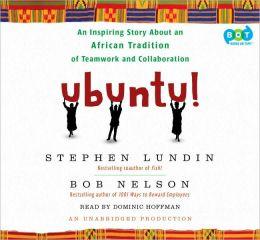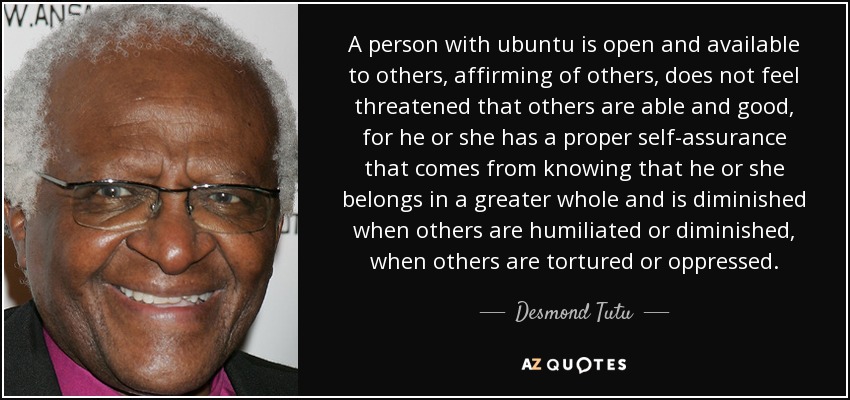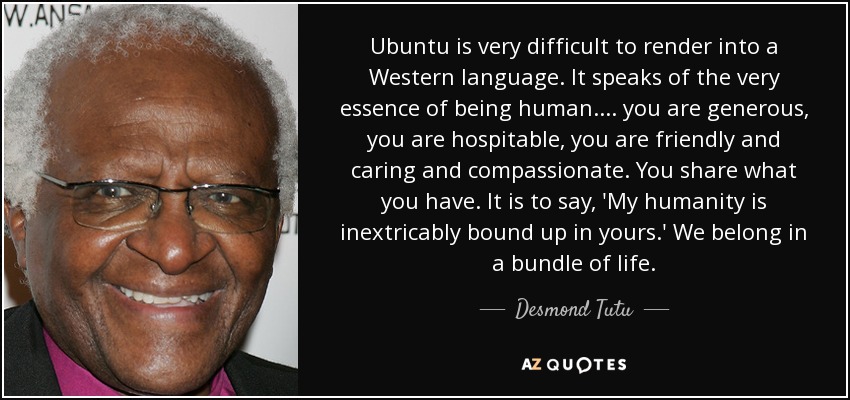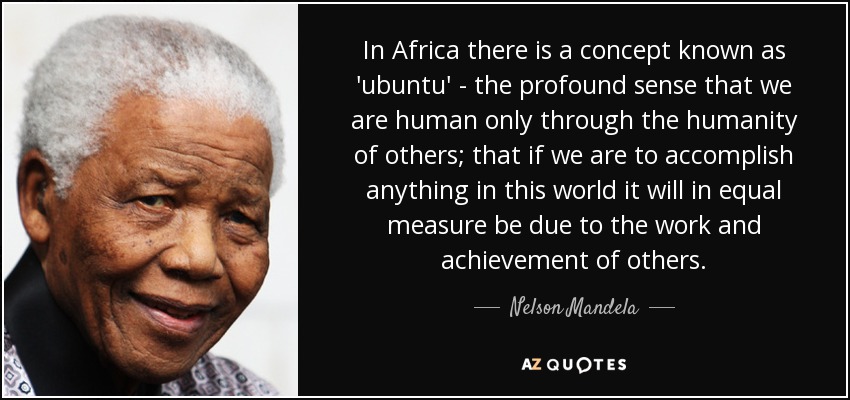Click here to return to Blog Post Intro

Despite the fact that people have similar values and essentially the same genes, the focus of our attention is often on our differences—Arab and Jew, Protestant and Catholic, Muslim and Christian, liberal and conservative—and the color of our skin—black, brown, red, yellow, or white. What if your organization could play a key role in bringing us together in the pursuit of purposeful lives while treating each other with respect, compassion, and dignity?
A Problem Emerges at Work
Ubuntu is the ancient African philosophy that draws on the fact that we are one human family—brothers and sisters, traveling this earth together. Ubuntu means we’re all in this together.
Ubuntu is a philosophy that considers the success of the group above that of the individual. It says that we exist because of our connection to the human community. America loves its sports teams (refer to my recent post on the Houston Astros!)—as do people all over the world. The teams that win the championships usually have to find a way to get beyond their focus on a few individual stars and become a genuine team, working together. Some team members may have more talent and make bigger salaries, but on the court or on the field those differences take a backseat to the interests of the team. And that motivates all the members. They are all respected; they all have an important role to play in winning.
The first step in bringing Ubuntu to life is discovering it in your own heart. Ubuntu comes from our natural energy within.
Ubuntu starts with recognizing and embracing the humanity, the equality, and the value of each person. To engage another person in an authentic way releases the most powerful energy on the planet. With trust and respect, others will give you the benefit of the doubt. Without trust and respect, motivational techniques come across as manipulation.
What if you don’t feel the respect for others? Do you fake it? Faking doesn’t work; you can’t build trust with dishonesty. Each of us can detect a phony. You can’t just do Ubuntu. You must find a way to be Ubuntu.
How do we be Ubuntu? The first step is to get to know your team members as people and not just as workers. That involves developing a sincere interest in each person. Ubuntu means respecting the person who does the work.
Part of the Ubuntu tradition is open feedback. When someone in a village is acting in a way that threatens the harmony and unity of the community, the elders take action. Ubuntu is a compassionate philosophy, but it is not soft. As one explained, “My temper was threatening the harmony of the community, and the woman, as an elder, felt the responsibility to tell me so.”
If you allow differences to define relationships, you will always be at odds with others. Ubuntu asks: “What do we have in common? How can we best work together?”
The people in a rural village in Africa support one another because it is for the common good. In a big company with a hierarchy, we can lose sight of our common bond. If you want to bring Ubuntu alive at work, you may need to start with your attitude and beliefs about people.
Ubuntu must begin with you. Do you believe you can change?
Discovering Wisdom in Africa
America is an amazing place. How often do we stop to realize how amazing it is? Even at times like this (the Thanksgiving holiday), isn’t it amazing how little gratitude people seem to feel for the abundance they have? Rather than be grateful for what they have, so many people seem to focus what they don’t have.
Ubuntu is the African philosophy that both Nelson Mandela and Desmond Tutu credited when asked how the reconciliation between blacks and whites could occur with so little bloodshed and without retribution. It is simple, they would explain. We are all members of the human family, and we must work together to achieve a strong South Africa. Surely, many wanted revenge after those years of atrocity? That is true. That is part of the genius of Mandela. His philosophy of reconciliation was built around an idea that existed throughout Africa. Because we are all connected in our humanity, Ubuntu suggests that to harm another person would be to harm yourself. To seek revenge on others would be to hurt yourself. Mandela and Bishop Tutu helped us understand that Ubuntu meant accepting the humanity of our oppressors even as we detested the years of oppression. We had to unconditionally accept the humanity of each human being.
Isn’t it amazing how an entire country shared such a sense of community?
The human spirit is like the dormant grass on the savanna, always waiting to spring to life with the next rain. Too often the human spirit lies dormant below the surface in the workplace. Ubuntu is the rain that can bring it to life!
Bringing Ubuntu Home
Ubuntu involves two levels of recognition:
- Value others simply for who they are. This is the heart of Ubuntu, and it must always come first.
- Value others for what they achieve. This kind of recognition is what drives most performance. Coaching, performance reviews, feedback, and other management tools are important, but they come second. Once the first level of recognition is present, the second level of recognition comes into play: rewarding and recognizing others for what they achieve, for their performance and results.
When you leave what is comfortable and familiar in order to take on something new and exciting, it is natural to feel unsettled and even afraid. This is where the support and collaboration of colleagues is most important. As William Bridges says, “A time of transition can be a time of great creativity.”
The Ubuntu philosophy (“We can be fully human only when we live in harmony with others”) and the values it represents can guide us to become:
- An organization where each person is treated respectfully and with dignity
- An environment of fun and hard work where team members come to one another’s assistance
- A home away from home where everyone is equal and where egos are replaced with gratitude and humility
- A community from which employees go home at the end of the day with the renewed energy and vitality that comes from hard work well done, pride, appreciation, and a sense of accomplishment
So, what is Ubuntu? Simply stated, it’s a philosophy of unity and purpose where our actions demonstrate a recognition and understanding that we are all connected. When we embrace Ubuntu, we choose to treat each other in an open, honest, and respectful way while working to achieve our goals. We respect each person’s humanity regardless of our differences. It’s spirit of humanity that allows us to empathize with each other and enables us to make a difference together in our lives and in our goals here at work… Bob Nelson and his co-author Stephen Lundin note, “We have seen firsthand how it can break down barriers between people and foster the pursuit of common goals.”

When recognition is given in a respectful way, it has a big impact on an individual’s morale and sense of purpose. One woman told the story of a handwritten note she had been given by a supervisor ten years ago; she keeps it posted over her desk to this day. As long as there are employees who think of themselves as “little people” the work of Ubuntu is not finished.
The door to Ubuntu is called gratitude, and it is always open. The path to Ubuntu is marked by our humanity; we follow the path from person to person. The spirit of Ubuntu is found through community. Community is created when you find unity of purpose with others.
May each of you discover the success and happiness that come from embracing the humanity of all whom you encounter.


